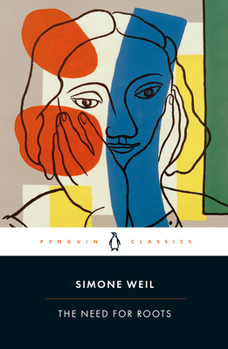The Need for Roots: Prelude to a Declaration of Obligations Towards the Human Being
Select Format
Select Condition 
Book Overview
French philosopher Simone Weil's best known work that promotes mindful living and instructs readers how they can once again feel rooted, in a cultural and spiritual sense, to their environment A Penguin Classic One of the foremost French philosophers of the last century, Simone Weil has been described by Andr Gide as "the patron saint of all outsiders" and by Albert Camus as "the only great spirit of our time." In this, her most...
Format:Paperback
Language:English
ISBN:0241467977
ISBN13:9780241467978
Release Date:February 2024
Publisher:Penguin Classics
Length:288 Pages
Weight:0.40 lbs.
Dimensions:0.8" x 5.0" x 7.7"
Customer Reviews
3 ratings
The soul's needs are many
Published by Thriftbooks.com User , 15 years ago
Unlike Whitman, who celebrated contradictions and made these explode like fireworks, Simone Weil tries to explain and fabricate a system out of the soul's contradictory "needs," (as distinct from wants), not as a form of celebration, but perhaps more in an attempt to provide calm. (We should probably remember that the author suffered from migraines.) Although the contradictions are many, and the reality of the described needs not always obvious, set forth by Weil these assume a tranquility that can only come from scientific precision and a truth that must be absolute. Here is the list: Order, Liberty, Obedience, Responsibility, Equality, Hierarchism, Honor, Punishment, Freedom of Opinion, Security, Risk, Private Property, Collective Property, and Truth. For additional detail on each, see inside.
A Book For The Ages
Published by Thriftbooks.com User , 24 years ago
In "The Need For Roots," Simone Weil cultivates perhaps the purest, most spiritual definition of Christianity ever put into words. She despises group thought, i.e., organized religion, while constantly referencing the words of Jesus Christ as being the essence of Christianity and a crucial model for living a "well-rooted" life.One need not be religious at all to identify with the type of religiosity expressed in this book. Simone Weil is no preacher. Going to church every Sunday does not impress her. Dropping money in the priest's basket does not impress her. Love, on the other hand, does. And not just love of God or of religion, but love of eveything we do in life. She stresses the need for love of truth, learning, physical labor and love for what she defines as "the good." Religion, for Simone Weil, should not just be limited to the church. Simone Weil believes that every aspect of life, everything we do, such as the pursuit of science or knowledge, should be as religious an experience as it was for the ancient Greeks; a civilization she draws reference to many times throughout the book. Her deep spirituality is strewn throughout these pages, and wakes up the mind to the hypocrissy, spiritual crisis, and moral "uprootedness" of human nature in the modern world. In the midst of stressing this deeply spiritual message, Simone Weil attempts to open the reader's eyes to newer, less narrow-minded definitions of patriotism and greatness, as well as noting the various fundamental uses of education. For Simone Weil, education is not just a kid going to school and trying to get a good grade. Education is for those who have a love of truth, a love of knowledge and an understanding of the importance those virtues carry. It is up to a well-rooted, healthy society to instill those virtues in each individual.Like the works of most complicated thinkers, this is no easy read. There are many different ideas spiraling around the core of spiritualism emphasized in "The Need For Roots." Simone Weil is extremely intellectual. It is unthinkable that she attained this level of brilliance by the time of her premature death at the age of 33. Most people will find themselves reading over paragraphs several times before fully understanding them. In the introduction, T.S. Elliot suggests that one reading of the book is insufficient, and he may be correct. Anyone who thinks they have grasped this book fully after reading over it once is either lazy, or, if they are correct, a freak of nature. However, the hard work required to tap into Simone Weil's stream of thought is well worth it. This is truly one of the most inspiring and provocative books I have read. While it was written in 1943 and adressed specifically to the state of France under the Vichy government, much of this book still remains crucially relevant today, perhaps even more so. If this book is read with discernment, rather than in the casual mode in which we often read, I
An outstanding critique of modernity by the late Simone Weil
Published by Thriftbooks.com User , 27 years ago
Two major contributions to the analysis of the modern society can be found in Weil's works. In his "Essay on the causes of freedom and oppression" of the early 1930s she had given a vision of why we are left unsatisfied by progress, substituting social oppression for natural one. Here, while in London just before dying, she gets to such a deep understanding of contemporary social and spiritual problems that has very few comparisons in this century. We needs roots, she assumes, and we find them belonging to alive communities feeding our souls. An entire programme of reform of modernity is developed from this assumption, and it is applied in detail to postwar perspectives in France. According to some of us, this is still a guidebook for understanding what can be done now, a source of inspiration for rethinking how modern societies could be eventually reconverted to serve human needs, instead of representing Plato's image (dear to Simone) of the apocalyptic Great Beast.






